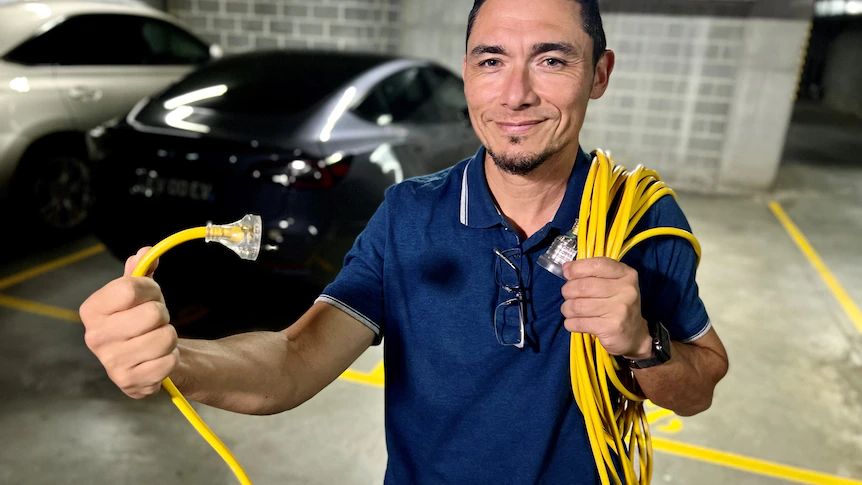The EV 'social equity' dilemma that may put apartment residents off electric cars
Holding a 100 metre cable, Mauricio Perez laughs about his bizarre predicament. This yellow cord is the only way he could feasibly charge his electric car at home.
He'd have to plug it into his living room's power point, run it down his third level apartment's balcony, and then into the building's car park up to his Tesla.
"I think given the safety issues that are involved, that's probably not acceptable," Mauricio says.
What if someone trips over the cable?
Mauricio isn't actually an EV Rapunzel.
But the cord analogy physically demonstrates the logistical nightmare that he is in — as an EV owner who rents an apartment.
Data given to ABC News shows the vast majority of private home chargers for EVs are going into standalone homes or units.
Mauricio's experience explains why.
Why can't Mauricio charge in his apartment car park?
Despite misconceptions, most EVs only need a standard plug to charge their batteries.
That's all that Mauricio wanted access to in his allocated car park when he bought his Tesla in December.
"I just wanted a simple power point", Mauricio said.
It was not simple.
The vast majority of apartments in Australia are managed by bodies corporate. These entities represent all the people who own the apartments in a building.
Shared spaces like car parks and gardens are common property. You need body corporate approval to renovate them. And works need to go to a vote.
The power that supplies shared spaces is also generally managed by body corporate too.
"You don't want to be sucking off the mains power. It's not very ethical to try and steal power", Mauricio says.
Mauricio says he got quotes for an EV charger to be installed in his allocated car park that would connect to his individual meter box.
When the quotes came back in the several thousands, Mauricio says he offered to pay, despite knowing that he couldn't take this infrastructure to his next rental.
"The landlord was really accommodating, as far as allowing the infrastructure to go ahead," Mauricio said.
But to date, the installation hasn't happened. Mauricio believes the body corporate is still mulling it over.
"(They) needed to approve everything so that it was safe, and it didn't overload the mains or didn't inconvenience the power draw for the whole apartment," Mauricio says.
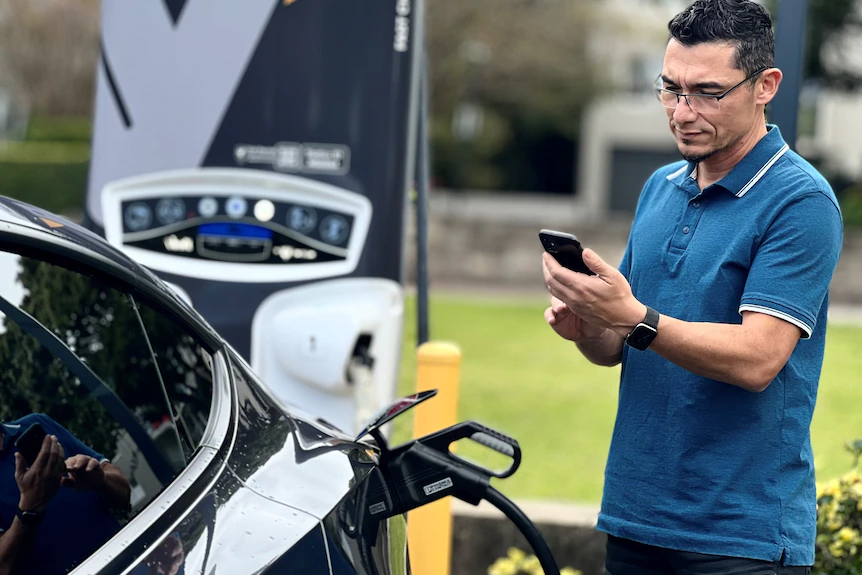
Mauricio Perez is making do with public chargers instead.(ABC News: John Gunn)
He's using public charging stations in his area instead. These can sometimes have queues for a spot, and he has to wait around while his EV charges.
He fills the time by doing errands like grocery shopping.
This is working for him, but he'd like the option of charging his Tesla while it's parked at home, and he's sleeping or working.
"This is about convenience," he says.
Some apartments are being proactive with EV charging
Mauricio's experience speaks to a broader debate going on across the country at body corporate meetings.
The Horizon in Sydney's Darlinghurst is one apartment block that is scoping out how much it would cost to overhaul its infrastructure for EV charging.
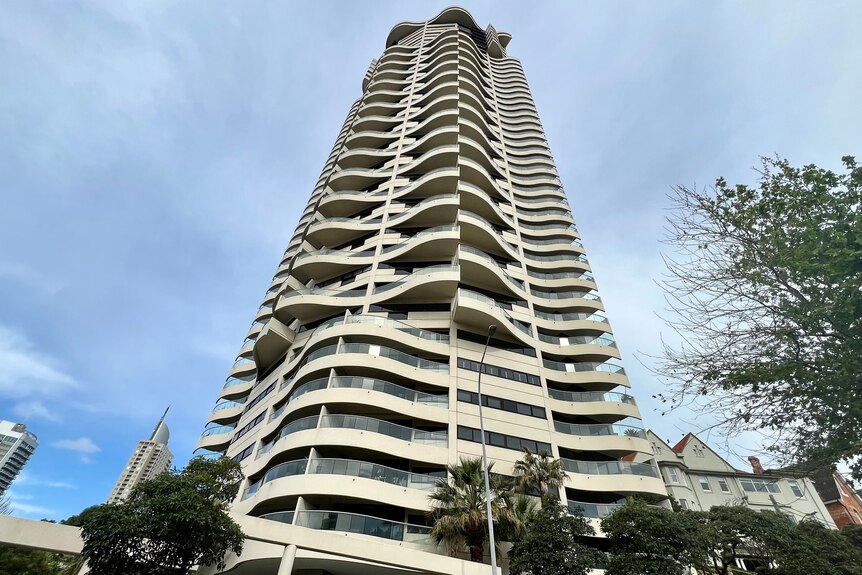
The 250-apartment complex the Horizon in Sydney has two public chargers for EVs.(ABC News: John Gunn)
The Horizon has been proactive in this space so far.
A few years ago, a handful of its 250 apartment owners bought early stage Teslas.
In 2019, they installed two chargers in the Horizon's public parking area that are connected to its mains power. Residents log onto an app to pay, and book them in advance.
These two facilities alone cost $20,000 and were paid for by the body corporate's sinking fund. Between 250 apartment owners, this worked out as a relatively cheap expense.
Sinking funds are typically how apartments pay for major works. They're a pool of cash put in by owners.
The EV conundrum for apartments is how to get sinking funds allocated to charging when lots of residents in the building don't yet drive the cars and see a benefit.
In Horizon's case, they have an EV owner on the body corporate board, which means they have a strong advocate for electrifying the building.
"(People need to) follow the future. They need to recognise the very rapid of escalation of interest in EVs," he says.
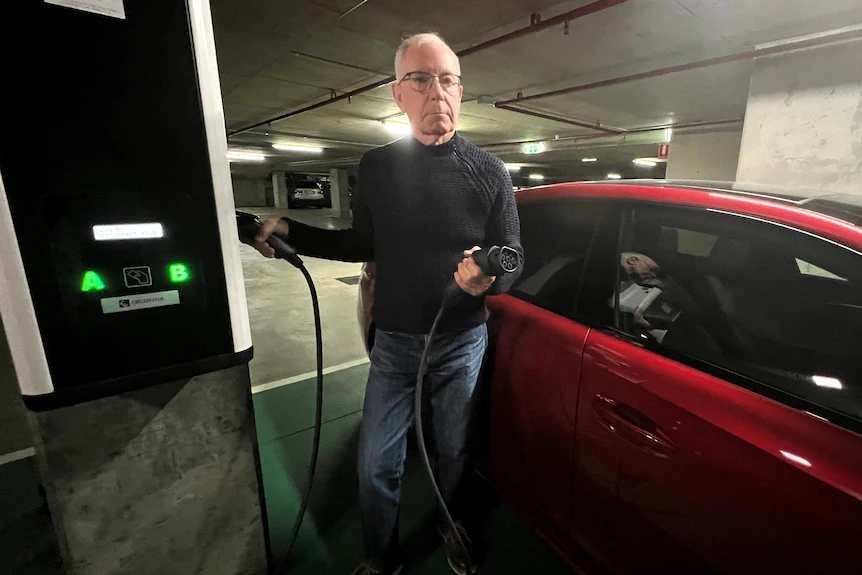
The Horizon's Peter Morton is one of many residents now using it's two public chargers for EVs.(ABC News: John Gunn)
The Horizon's resident surveys are now finding that up to 80 of them want to buy EVs in coming years.
Given that, the body corporate is now mulling a much larger project for residents. This could involve individual charging stations to each of the residents' personal car parks.
"In the long-term, it may become a necessary option," Peter says.
He acknowledges that the Horizon is in for a big overhaul.
"The complexity is not just cost and commitment. It's actually having the capacity in the building to power the (EV chargers)."
Ninety-five per cent of private property EV chargers going into homes
With all of these complications, it is no surprise that specialist EV charger installers aren't getting a lot of work from apartment owners right now.
The Electric Vehicle Council (EVC) told ABC News that 95 per cent of personal EV chargers are going into homes, with apartments largely missing out.
Russ Shepherd is the local director of an installation company, MyEnergi.
He says his "heart typically sinks" when somebody calls up wanting a charger installed in an apartment car park.
"The biggest challenge is navigating the body corporate approvals to be able to get the point where one of the installers can turn up and actually install the charger," he says.
He says the reason why apartment jobs are often far more expensive is all the copper wiring involved. Plus some buildings need extra work on mains.
Some of the more complicated apartment jobs that MyEnergi has quoted have started at $20,000. This compares to as low as $1,500 for a freestanding homes.
Another company, Jet Charge, says they are typically done for between two-to-four times the cost of a home.
Its co-founder, Ellen Liang, says they are getting some apartment installations done by working with body corporates to explain the benefits of having EV infrastructure.
She says the tide is shifting, and apartments managers are getting more open minded. But there is still a lot of wrangling and questions.
"There's a range of excuses that basically mean that the decision just gets drawn out," she says.
The EVC estimates that around 55,000 people now own either a full electric or hybrid vehicle in Australia. The projections are that this will keep growing.
This week, the federal government is releasing a long-awaited issues paper that will outline how it plans to make EVs cheaper so more people buy them.
That's part of the Labor government's pledge to lower carbon emissions.
Anecdotally, most of the people buying relatively more expensive EVs right now are richer people who can afford to live in standalone homes.
In Australia, 2.2 million people live in apartments or sky rises. They are typically on lower incomes, and many of them are renters.
"EVs give people access to cheaper fuel. And it's something that apartment owners shouldn't not have access to just because they live in an apartment," Ellen says.
"Basically, we see this as a social equity issue."
What is being done for EV owners in apartments?
From October 2023, it will be mandatory that all new apartment blocks are built with the infrastructure to allow electric car charging.
This change to the national construction code was decided at a national meeting of state building ministers convened last month by the federal minister for industry and science, Ed Husic.
When it comes to retrofitting existing apartments, many layers of bureaucracy could get involved across federal, state and territory governments, and even local councils.
Minister Husic's office also flagged a new federal trial where $871,000 will be spent on chargers on NSW street poles for residents without off-street parking or car park charging.
As well as initiatives like this, more local councils and companies are installing public ones chargers, like Mauricio uses in his local neighbourhood.

As apartment owners miss out on chargers, more companies and councils are installing public ones for them to use instead.(ABC News: John Gunn)
State by state, an ad-hoc approach is emerging as the apartment conundrum continues.
For instance, in the latest NSW state budget, $10 million was allocated for retrofitting apartments. This won't go far, when you consider the Horizon's demands alone.
A NSW government spokesperson said this scheme is still in "design phase" and should go live in mid-2023.
Aside from cost, advocates for people who live in apartments say that more can be done to push body corporates to approve EV installations.
In NSW, the percentage of people on a body corporate who can vote against a proposal with environmental benefits was just lowered. This will cover EV chargers in car parks.
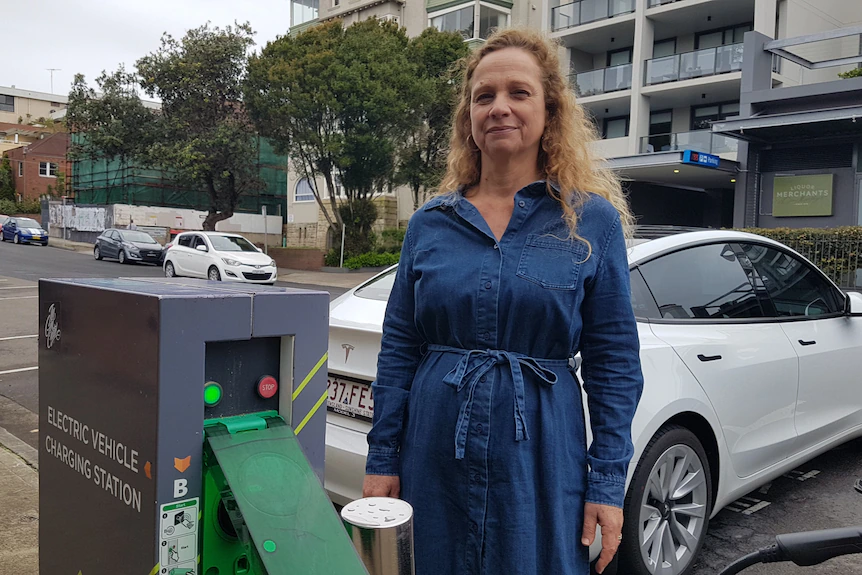
Professor Cathy Sherry says ensuring apartment owners have access to EV charging is "a social equity issue".(ABC News: Thorsten Joses)
"That's a really significant change," says Macquarie University professor of law, Cathy Sherry.
Professor Sherry specialises in the issues faced by apartment dwellers. She says there's precedents to the EV charging situation, including the solar and NBN rollout.
"It is entirely possible for state governments to mandate this for (existing buildings)," she says.
"The most important thing that governments can do is provide templates and guides. So that (people) are not flying blind."
She agrees with Jet Charge's Ellen Liang that this is a "social equity" issue.
"With urban consolidation and the cost of housing in Australia, many people are not actively choosing to live in apartments or to live in collective living situations.
"They simply have no choice. It's all that they can afford.
"Older Australians and generation X baby boomers can afford their own houses. They're living in freestanding houses.
"For younger people, very often the only form of affordable housing they can they can access either as as tenants or owners will be apartments.
"And if we want them to have access to electric vehicles and to make their contribution to reducing climate change, then this most definitely is an equity issue."
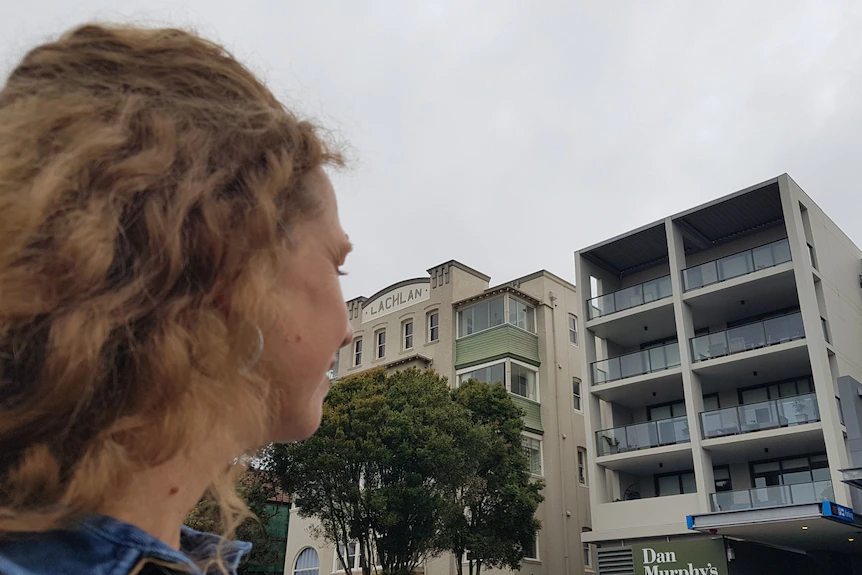
Professor Cathy Sherry says ensuring apartment owners have access to EV charging is "a social equity issue".(ABC News: Thorsten Joses)
